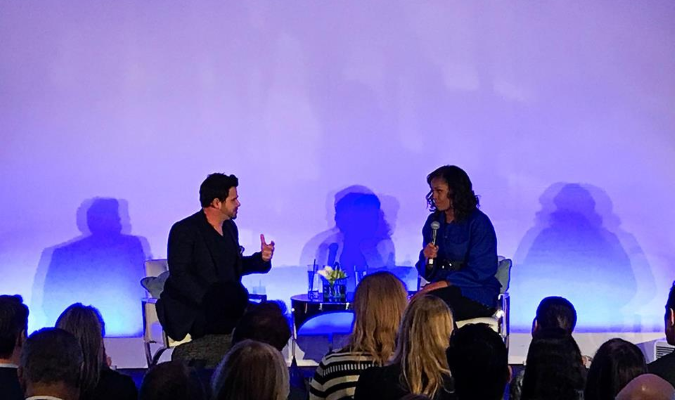NEW YORK: Former first lady Michelle Obama encouraged health professionals on Tuesday to remember that some patients, like her father who had multiple sclerosis, can feel “intimidated” by the health system and advances in technology.
“It’s not enough just to create [medical technology], there are so many people who feel intimidated by it,” Obama said. “They don’t feel comfortable in it so they don’t access it. So we have to think about the people side of medicine, too. You can create the best treatments, but if people don’t have a relationship to the medical profession, they don’t have ways to have those conversations, and they feel intimidated or afraid by the answers and will never seek it out.”
Obama spoke at Klick Health’s Muse New York event on Tuesday, covering everything from health to social media to her “new normal” life after the White House.
Obama described watching her father struggle with MS as her first exposure to what happens when one is an uninformed patient. She stressed the value of making healthcare and new advances in health accessible to all and eliminating barriers that keep people from accessing health tech.
When it comes to social media, Obama conceded that she has help crafting her tweets and snaps and took a subtle jab at President Donald Trump’s tweets.
“I tweet by committee,” she said. “I don’t just tweet off the top of my head, which I don’t encourage people to do – especially kids. Yes, I use social media, but I use it like a grown up.”
Obama acknowledged the power of social media in fueling movements like Black Lives Matter and the work of the Florida student gun-control activists.
She also denied that she has any plans to run for office herself, saying that she and former President Barack Obama are focusing on developing the next generation of leaders, like the Parkland students or other young activists. She emphasized the power of the people, rather than leaders, when it comes to making change.
“That is why I’m not running for president,” she added. “I think it’s a better investment to invest in creating thousands and thousands of ‘me’s. The important thing is stepping out of the way and making room.”
Gene therapy
Also at the event, executives from pharma and biotech companies Spark Therapeutics, Regeneron, and Sangamo Therapeutics discussed advances in gene therapy treatments, the combination of big data and gene therapy, and how gene therapies compared to traditional treatments.
“It’s a very exciting time in the history of human biology and the history of trying to intervene in human biology, in that we have big data to use,” said George Yancopoulos, president and chief scientific officers at Regeneron.
Technology
Representatives from Amazon and Google came together with hospital and university leaders to talk about how technology from Silicon Valley is making its way to the patient.
Tools like AI, data, voice technology, and others are being used to educate patients, help hospitals and doctors manage troves of data, and make communication easier between the patient and hospital.
“We’re developing technology and tools not only to extract and utilize that data but also communicate and interact with patients even in the home,” said John Brownstein, chief innovation officer at Boston Children’s Hospital. “We are now using these technologies not only to provide education, but also for our own resources.”
Michael Docktor, pediatric gastroenterologist at Boston Children’s Hospital, and Yan Fossat of Klick Health also presented some of these advances live at Muse. Docktor has been using VR to help pediatric patients understand their gastrointestinal diseases at Boston Children’s







